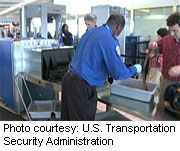- Could Your Grocery Store Meat Be Causing Recurring UTIs?
- Are You Making This Expensive Thermostat Error This Winter?
- Recognizing the Signs of Hypothyroidism
- 10 Strategies to Overcome Insomnia
- Could Artificial Sweeteners Be Aging the Brain Faster?
- Techniques for Soothing Your Nervous System
- Does the Water in Your House Smell Funny? Here’s Why
- Can a Daily Dose of Apple Cider Vinegar Actually Aid Weight Loss?
- 6 Health Beverages That Can Actually Spike Your Blood Sugar
- Treatment Options for Social Anxiety Disorder
Airport Screenings Miss Roughly Half of Sick Travelers: Study


FRIDAY, Feb. 27, 2015
Airport screenings for infectious diseases often miss 50 percent or more of sick travelers, mostly because people do not tell the truth about their exposure to illnesses, a new study suggests.
“Honest reporting can not only improve on-site detection, but is essential to enable authorities to follow up with travelers who may have been exposed but have not yet developed symptoms,” wrote researcher and graduate student Katelyn Gostic, from the Lloyd-Smith Lab at University of California, Los Angeles.
Using a mathematical model, researchers from UCLA and the London School of Hygiene and Tropical Medicine analyzed airport screenings for six viruses: SARS coronavirus, Ebola virus, Middle East respiratory syndrome coronavirus (MERS-CoV), Marburg virus, influenza H1N1, and influenza H7N9.
They found one of the biggest barriers to successful health screenings at airports is a lack of honesty among passengers. This is a particular issue among travelers trying to avoid delays, they noted.
Gaining a better understanding of how infectious diseases progress could help ensure that passengers are asked the appropriate questions in screening surveys, the researchers said. For example, being exposed to a symptomatic Ebola patient is a risk factor for contracting the disease.
At best, 25 percent of people were honest about their exposure to the flu during the 2009 pandemic, the study published recently in the journal eLife showed. The researchers pointed out that some passengers might have even concealed their symptoms with medication.
The study’s authors suggested that policymakers consider devoting more resources to arrival screening, which could reduce the number of missed cases.
“We found that for diseases with a long incubation period such as Marburg and Ebola, taking passengers’ temperature to test for fever is particularly ineffective at the start of an epidemic but does pick up more cases as it stabilizes,” Gostic said. In the early phase of disease epidemics, questionnaires are the most effective way to detect potential illnesses, she added.
Although screening for fevers upon arrival at a destination has been criticized for being ineffective, the study found this method could catch cases that were missed at departure.
When it comes to diseases such as swine flu, which take a shorter time to incubate, Gostic noted that fever screening is the most effective method throughout an epidemic.
Infrared noncontact thermometers do not pick up all fevers, usually only catching them 70 percent of the time, the researchers pointed out.
More information
The U.S. Centers for Disease Control and Prevention provides more information on health screenings at airports.
Source: HealthDay
Copyright © 2026 HealthDay. All rights reserved.










